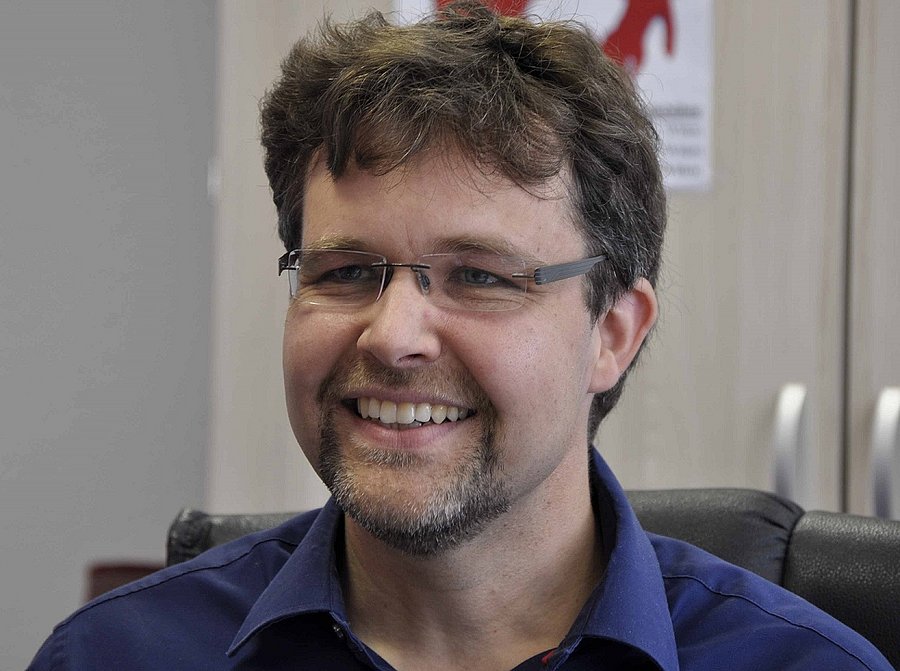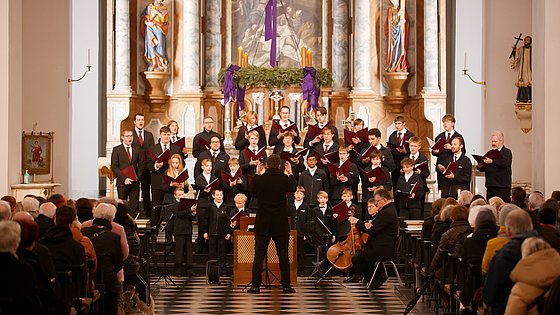
Foundation of the Elberfelder Kurrende
Prof Dr Helmke Jan Keden/ Music Education
Photo: UniService Transfer
Edification and consolation through sacred song
Music teacher Helmke Jan Keden on the founding of the Elberfelder Kurrende 100 years ago
Mr Keden, the Elberfelder Kurrende was founded on 22 March 1924. What does Kurrende actually mean?
Keden: Not everyone will be immediately familiar with the term. It comes from Latin and is probably made up of "currere" meaning to run and "corradere" meaning to scrape together or "corredo" meaning to earn a living. It originally referred to small groups of needy singing pupils who travelled from house to house begging. From the end of the Middle Ages, these groups sang sacred songs during so-called "Kurrendenumgänge" in the hope of obtaining food. By the 18th century, carol singing had rapidly gained in importance. This was also linked to the dynamic development of the church school system. In the Reformation school system and linked to Lutheran congregations, the Kurrenden became an integral part of spiritual and public cultural life in many places. Incidentally, Martin Luther sang in the Eisenach Kurrende. Bach's death in 1750 put a damper on the currende system. It was only with the emergence of the reform pedagogical and church music renewal movements at the end of the 19th century that the idea of the Kurrende gained new momentum. At this time, however, the function of singing alms no longer played a role. In addition to the spiritual and moral education of the growing Kurrendans and church music activities, the focus was now primarily on welfare work for the needy in the spirit of Christian charity. This period also saw the founding of the Wuppertal Kurrende.
According to the annals, there were 80 boys and 17 men who emerged from a youth choir of the YMCA. Where did the choir perform?
Keden: If you look in the first commemorative publication from 1949 to mark the 25th anniversary of the choir - at that time it was still called the Elberfelder Kurrende - you will find the following information: Immediately after its foundation, the choir's first public concert took place on 8 April in the large hall of the Wuppertal Stadthalle. The songs sung included folk songs, Mendelssohn's Engelsterzett and Mozart's Ave Verum. The choir accompanied numerous church services in Wuppertal's city churches. From the very beginning, the Kurrende's programme also included challenging oratorio concerts. A highlight of the early years was certainly the performance of Bach's St Matthew Passion in the Old Reformed Church (now the CityKirche Elberfeld) on Palm Sunday, 9 April 1933. Erich vom Baur, who had founded and directed the choir, had rehearsed the work in just eight weeks. In addition to these impressive artistic achievements, the Kurrende also undertook numerous concert tours and was involved in social activities from the very beginning, e.g. at charity concerts or as part of the so-called Singumgänge.
What was that?
Keden: As early as mid-May 1924, Erich vom Baur regularly visited the needy and sick on Sunday mornings with the Kurrende, sang in streets and squares, in old people's homes and hospitals, and even in bunkers during the war - and no longer to beg for alms as in the late Middle Ages, but always with the social intention of giving people edification and comfort through spiritual song. This commitment runs through the entire 100-year history of the ensemble and is still important for the identity of the Kurrende today, especially as - or perhaps because - the choir continues to see itself firmly anchored in the Christian tradition in our secularised world.
The Kurrende soon became very successful and was even given its own rehearsal rooms in Herzogstraße from 1932, but these were completely destroyed during the attack on Wuppertal in June 1943. What happened next?
Keden: That was a bitter blow for the Wuppertal Kurrende, especially as three Kurrendans also lost their lives in the attack. But Erich vom Baur was undeterred and initially continued to work with eight boys in his private flat. The choir was able to present itself to the public again in the Kreuzkirche for the Reformation celebration on 31 October 1943. However, due to constant air raids, rehearsals and concerts had to be largely cancelled in the following years. A total of 70 former Kurrendans died in the Second World War. After the end of the war, Erich vom Baur performed again with the Kurrende in the cemetery church on Reformation Day 1945. By 1948, the choir once again had 160 active singers from all over the city, so the ensemble was renamed the Wuppertal Kurrende a year later.
The choral works also became increasingly demanding over time. What were the works performed?
Keden: As already mentioned, the choir reached an enormous level of performance very quickly after it was founded. Accordingly, the repertoire included important standard works of sacred choral music by Bach, Mozart, Handel, Mendelssohn and Haydn. In addition to these classics, contemporary works are still performed or even premiered today. From time to time, the Kurrende also takes part in opera performances. It is not easy to maintain such a high level of performance over a long period of time. In a boys' choir in particular, the natural voice change means that all the voices have to be gradually replaced within a few years. The only way to counteract this is through continuous work with young talent, which can also be seen in the Wuppertal Kurrende. In the course of its existence, the work with young talent has become increasingly professionalised and also includes non-musical activities to inspire young people not only for performance-oriented singing, but also for the entire Kurrende idea. This has made it possible for the Wuppertal Kurrende to draw on an extremely wide-ranging - mostly Christian - repertoire, which still appeals to a wide range of audiences today.

Performance in the Laurentiuskirche
Photo: Wuppertaler Kurrende
The Wuppertal Kurrende, an organisation of the Wuppertal church district, is now the oldest boys' choir in the Protestant Church in the Rhineland and is active far beyond the city limits. Where do they perform?
Keden: The choir's sphere of activity is enormous. Since it was founded, the Wuppertal Kurrende has undertaken numerous concert tours, some of them as far as overseas. It has successfully taken part in many renowned choir competitions and has also been heard on many radio and television recordings since the 1950s. In addition, numerous LPs and CDs have been produced, testifying to the consistently high standard of the ensemble. In addition, the ensemble also co-operates with other renowned boys' choirs in Germany. The inner-German exchange in divided Germany was also promoted.
Heinz-Rudolph Meier also conducted the Bergische Universität choir for several years. What successes did he achieve?
Keden: Heinz-Rudolf Meier, who directed the Kurrende from 1979 to 2005, earned special merits: in 1984 and in 1989, the year of reunification, he travelled to East Germany with the Wuppertal Kurrende.
Under the aegis of Heinz-Rudolph Meier, the musical quality of the Wuppertal Kurrende was further enhanced. Highlights of his work included the performance of the St Matthew Passion and winning the German National Choir Competition in the boys' choir category for the first time. His achievements also include the founding of the Elberfelder Mädchenkurrende in 2002. Meier also showed great commitment in the social field. His rehearsal work must have been unique. I myself was able to get to know Meier's teaching activities personally as part of my school music studies at the University of Wuppertal, where he taught conducting as well as directing the university choir - something that has made a lasting impression on me to this day.
Where can the choir be heard again soon?
Keden: The Kurrende performs all the time - just take a look at the ensemble's homepage, which provides a good overview. For me, the highlights this year are the big anniversary event on 26 June in the Wuppertal Stadthalle - including a performance of Mendelssohn's Lobgesang - and of course the traditional Quempassingen on 14 December in the Christuskirche and 15 December in the Friedhofskirche.
Uwe Blass
Prof Dr Helmke Jan Keden has been teaching music education at the University of Wuppertal since 2017.
